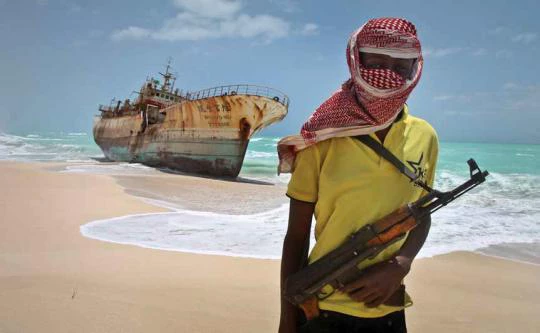
We’ve come to Mogadishu to present the findings of a new Bank study called The Pirates of Somalia: Ending the Threat, Rebuilding a Nation to senior ministers from the Somali government. The report concludes that Somalia cannot ‘buy’ its way out of piracy, and neither can the international community rely solely on its navies and law enforcement agencies to defeat the pirates, whether at sea or on land. The solution to Somali piracy is first and foremost political.
Piracy off the Horn of Africa costs the global economy roughly US$18 billion a year in increased trade costs — an amount that dwarfs the estimated US$53 million average annual ransom paid since 2005, World Bank lead author and Senior Economist, Dr. Quy-Toan Do explains in his presentation to the Somali Ministers and 60 Somali journalists. The threat of piracy forces shippers to alter their routes and pay more for fuel and insurance.
Not only has piracy imposed a hidden tax on world trade generally, it has severely affected the economic activities of neighboring countries. Since 2006 East African countries have seen a marked decline in tourist arrivals and fishing yields. In the booming tourism sector, spending in East Africa since the surge in pirate activities has grown 25 percent more slowly than in other sub-Saharan African countries. Somalia itself has also suffered considerably from the impact of piracy. Increased trade costs are estimated to cost the country US$6 million annually; and this figure does not take into account that Somalia cannot develop and expand its maritime trade and fisheries as long as pirates are allowed to operate in its waters.
Bella Bird, the World Bank’s Country Director for Somalia, and her team are forging a strategy for guiding the Bank’s development program here over the next 2-3 years. Bird suggests to the Somali ministers and journalists that the new piracy report is part of the Bank’s commitment to helping Somalia get back on its feet and rebuild; and that there are reasons for guarded optimism that Somalia may finally have an opportunity to move forward.
She notes that the election of President Hassan Sheikh in August last year and the formation of the government have revived hopes in the country’s ability to move from fragility towards sustainable stability and improved governance. For the first time since the collapse of the Siad Barre regime in 1991, Somalia has a federal government and a provisional constitution.
Promising events in the political sphere have converged with an 18-month period of important military gains in southern Somalia - although these gains are fragile. Economic activity has revived in Mogadishu, and the return of Somalis living abroad is bringing desperately needed new investment and skills. Some 63,000 expatriate Somalis returned here to live in 2012 alone, according to the UN. Another promising sign is that airline flights have gone up; Turkish Airlines now operates a route to and from Mogadishu.
“Right now is a historic time for the country and people of Somalia,” says Bird. “The World Bank has pledged its strong support to the President and the new government.”
The Somali Minister for National Resources, Abdirizak Omar Mohamed, acknowledges that Somali piracy has caused “great pain to Somalia” for the harm done to the rest of East Africa and the global community. The Minister also agrees with the report’s main finding that the rebuilding of a viable Somali state is the best long-term solution to ending piracy.
The good news is that piracy episodes have fallen dramatically. Heavily-armed naval patrols and better security on commercial shipping vessels may explain why piracy plunged in 2011 and 2012. However these measures are only effective as long as they stay in force. In the absence of a long-term Somali political solution onshore, the high costs of these countermeasures may simply become too expensive to keep up, and the threat of resurgent piracy will not be far behind.
By late afternoon, a nearby mosque in Mogadishu calls the faithful to prayers with a loudspeaker announcement. The heat of the day has given way to an off-shore breeze as we board the UN flight back to Kenya. Just across the Somali border, we land in the Kenyan desert town of Wajir, where Kenyan government officials make a security sweep of the aircraft. They are looking for weapons, contraband, and illegal immigrants who may have stowed away. It’s a reminder of the high stakes involved for Kenya, which has supplied soldiers and other support to the new government in Mogadishu.
“I hear things are much better in Somalia now,” a Kenyan customs officer tells me as he X-rays my bags in Wajir. “It’s time to bring our Kenyan soldiers back home now that it’s more peaceful.”
I certainly hope so, I tell him before boarding the flight. He is among the many East Africans who want to believe Somalia’s President Hasan Mohamud when he says: “Our country is moving and will keep moving forward and will not be prevented to achieve the ultimate noble goal of a peaceful and stable Somalia by a few desperate terrorists.”
A version of this article was originally posted April 16, 2013 on the Nasikiliza blog.


Join the Conversation